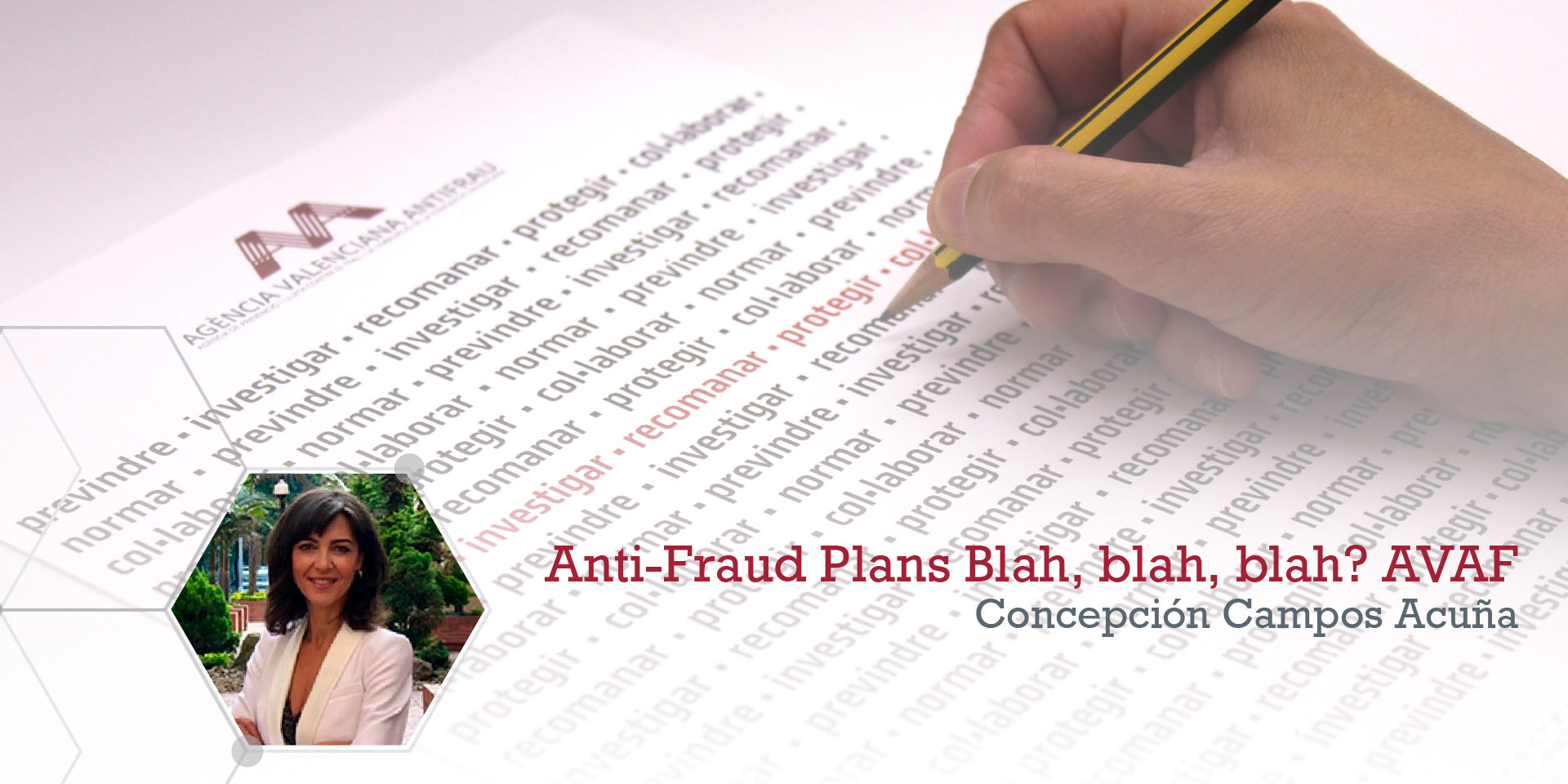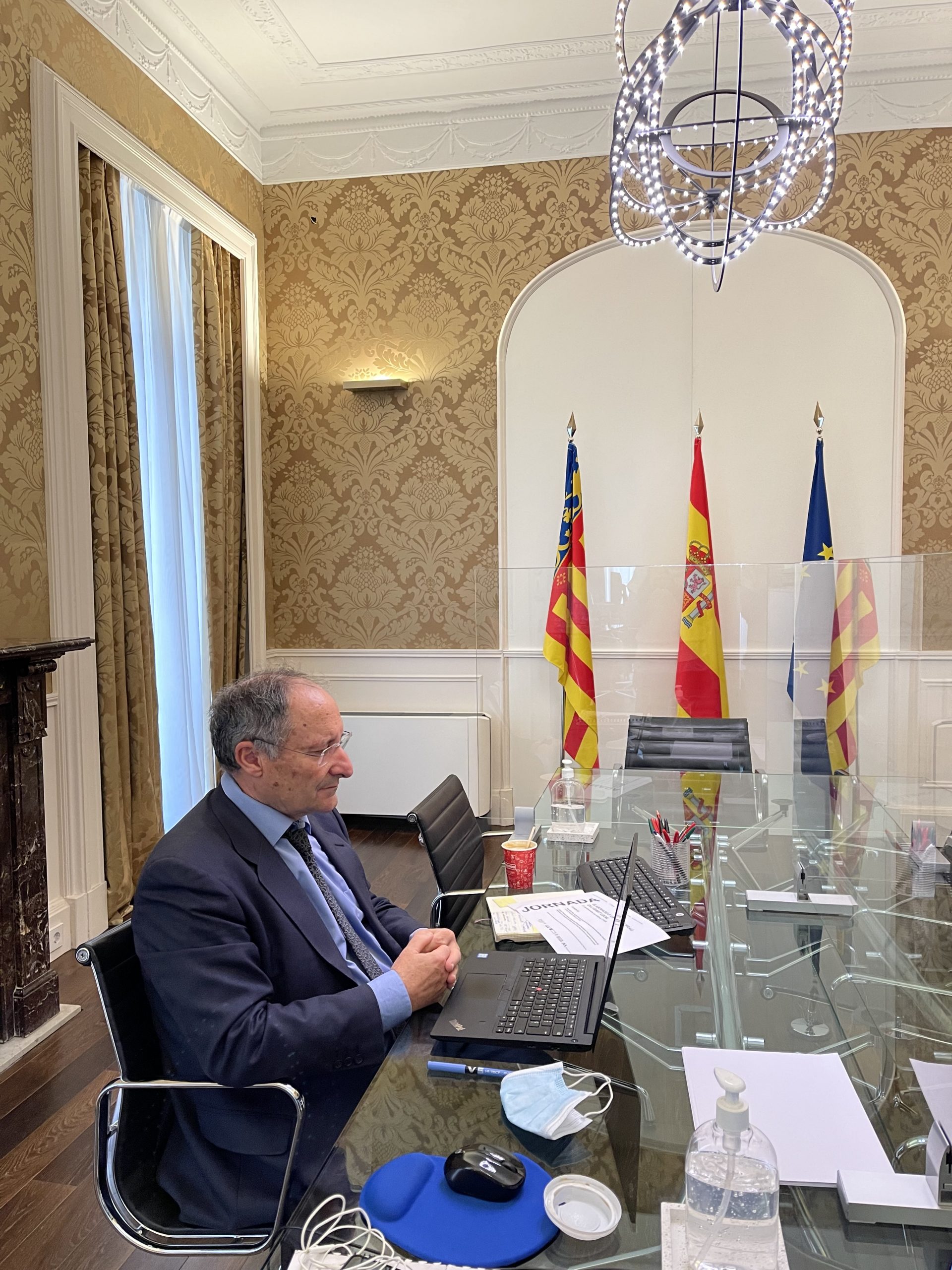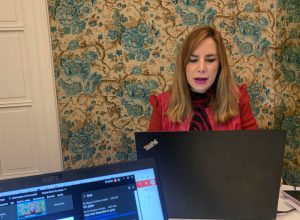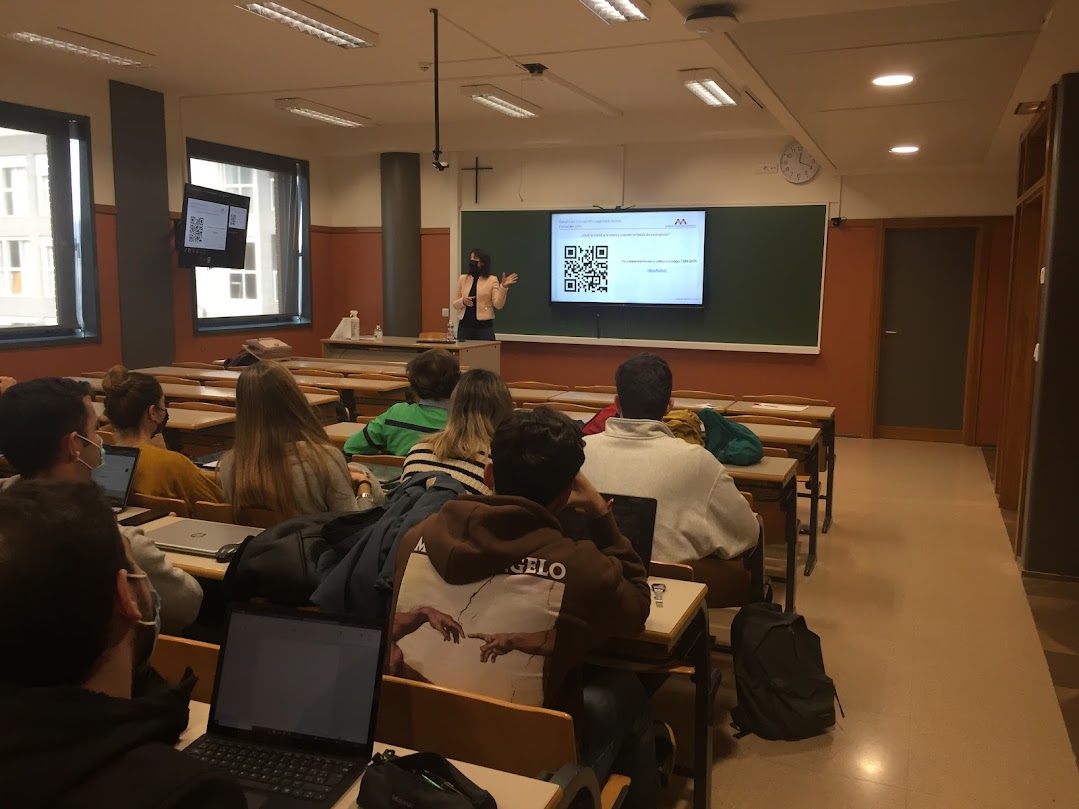“Blah, blah, blah”…, with this onomatopoeia the activist Greta Thunberg summarized the outcome of the Glasgow climate summit, at COP 26, in relation to the agreements reached and the real impact it will have on the objectives pursued, in summary, pure facade and empty speech. This same feeling is what I am having with the requirement of Anti-Fraud Plans established by Order HFP / 1030/2021, of September 29, which configures the management system of the Recovery, Transformation and Resilience Plan, with the It is intended to provide a framework of integrity to the entities responsible for the management of the Recovery Plan.
A preliminary reflection. The non-existent general culture of integrity or Compliance (compliance) plans / programs / systems, and not only as a desirable objective from the perspective of the institutional culture of good governance and good administration, but also when there is a specific legal obligation and enforceable, as it happens in the matter of contracting. As we have repeatedly pointed out, Law 9/2017, of November 8, on Public Sector Contracts (LCSP) includes a clear commitment to integrity and, specifically, in art. 64 imposes on the contracting authorities the duty to take the appropriate measures to fight against fraud, favoritism and corruption, and to prevent, detect and effectively solve conflicts of interest that may arise in bidding procedures in order to to avoid any distortion of competition and to guarantee transparency in the procedure and equal treatment of all candidates and tenderers. Obligation that, apart from some exceptional examples, such as the Integrity Plan in Public Procurement of the Vigo City Council (whose consultation I recommend) has not been fulfilled in general, so it is still necessary to have a robust system of incentives for compliance, and it seems that in this case, access to the financing contemplated by the Recovery, Transformation and Resilience Plan Funds (PRTR) may be sufficient. Or not.
Before entering the matter, the obligatory criticism that deserves how selective this obligation is. As it is framed exclusively as a duty for the projects and subprojects in which the measures (reforms / investments) provided for in the components of the PRTR are broken down, and not for the public management as a whole. As if the destination of the other public funds, which are largely paid for with citizens’ taxes, were not worthy of guaranteeing their correct use, for the defense of the general interest and the improvement of public services. In this way, the technique used in its day by Royal Decree-Law 36/2020, of December 30, which approves urgent measures for the modernization of the Public Administration and for the execution of the Plan of Recovery, Transformation and Resilience. This rule was intended to establish an execution framework with which to avoid the administrative obstacles and bottlenecks detected and that only deserve to be eliminated for this purpose, not for ordinary public management.
- Anti-fraud plans, mandatory?
The Ministerial Order establishes in its article 6 the obligation that every entity, decision-maker or executor, that participates in the execution of the PRTR measures must have a “Plan of anti-fraud measures”. The purpose of this imposition is to allow you to guarantee and declare that, in your respective scope of action, the corresponding funds have been used in accordance with the applicable regulations, in particular, with regard to the prevention, detection and correction of fraud, corruption and conflicts of interest, as a reinforcement of these mechanisms and thus complying with the obligations that article 22 of Regulation (EU) 241/2021 of the European Parliament and of the Council, of February 12, 2021, imposes on Spain in relation to the protection of the financial interests of the Union as a beneficiary of the MRR funds.
Mistrust in public management? We must not see it that way, it is not a veiled accusation, it is well known that integrity constitutes one of the pillars that backbone the management of the European Union, which it transfers and imposes on the Member States in the execution of funds. There is a clear precedent, the management of the EDUSI Funds, which had already been a step forward in relation to ethical standards in management, by imposing different obligations, such as the declaration of conflicts of interest, having ethical codes, commissions and other issues. But now, with the requirement of what are known as anti-fraud plans, a further step is taken and we hope that it will be extended with greater scope than the PRTR.
Although in reality, non-compliance is part of the DNA of our model. As a sample, a button. The deadline to carry out the transposition work of Directive (EU) 2019/1937 Of the European Parliament and of the Council of October 23, 2019 on the protection of people who report infringements of Union law, despite the time has elapsed and its inclusion in the Annual Regulatory Plan, the transposition law is neither expected nor expected, within the established deadline, December 17, 2021.
- Some interesting observations
From the reading of the Ministerial Order, the mechanism of operation of the Anti-Fraud Plans can be deduced, but there are a couple of observations that we must highlight. The first, the term. 90 days, how daring, how is it possible to develop an Anti-Fraud Plan in such a short time. I turn the question around, how is it possible that in September 2021 we do not have an integrity system in public administrations, how with a regulatory framework on transparency and good governance, with a multitude of regional and local bodies, specialized in the prevention and fight against fraud and corruption, the first reaction of the majority of public entities, their managers and employees, has been to criticize the shortness of the deadline, the impossibility of complying in just 90 days, with this legal obligation. Two points, the first the one already mentioned, neither in the regulatory framework nor in the configuration of the public management of the XXI century there is room for an administration that has not defined an institutional integrity policy, the incredible thing is how anemic the systems that support it . The second, the 90-day period is for preparation and approval, not for implementation, which is the really difficult thing, to achieve cultural transformation, and to introduce an ethical dimension in the actions of the public powers and the administration.
The second observation, on the content. Although the standard does not establish a closed model, since the choice of prevention and detection measures is left to the discretion of the entity that assumes management responsibility, taking into account its specific characteristics and always taking into account the need to guarantee a convenient protection of the interests of the Union, in its article 6 it does specifically include a series of requirements to which the content of the Anti-Fraud Plan must comply and configures as mandatory actions for the management bodies, the evaluation of fraud risk, the completion of of the Declaration of Absence of Conflict of Interest (DACI) and the availability of a procedure to address conflicts of interest.
Precisely in order to achieve homogeneity in the design of the measures by the participants, and without prejudice to the application of additional measures taking into account the characteristics and specific risks of the entity in question, the OM establishes two instruments of support: Annex II.B.5 and Annex III.C. A self-assessment questionnaire relative to the minimum standard, which allows the different entities to take a short X-ray of the state of health of institutional ethics, the scope of their public policies on integrity, transparency and good governance. The second of Annexes III.C, which contains reference to measures for the prevention, detection and correction of fraud, corruption and conflict of interest.
Bla bla bla….
But will these Anti-Fraud Plans help? The incentive to comply is clear: the perception of the funds, but in the face of the ideal scenario of a plan adjusted to the characteristics of the respective entity and, consequently, that can serve its purpose, we find ourselves with two undesirable situations. On the one hand, that expert firms in anti-fraud plans, in Compliance in the public sector, have quickly begun to sprout. On the other, the copy and paste. Regarding the first, companies that without ever having conjugated the verb prevent, are now experts in Compliance in the public sector, in the preparation and implementation of anti-fraud plans. As for the second, thinking that the same document, with a couple of changes here and others there, changing the name of the entity and some small details, will be enough to comply with the legal obligation aimed at improving standards. integrity, to the prevention of fraud and corruption.
They won’t do. They will not serve because the OM speaks specifically of the development of an ethical culture, based on some aspects such as the promotion of values such as integrity, objectivity, accountability and honesty. Because the OM specifically talks about the fact that the respective entity must foresee the realization, of an evaluation of the risk, impact and probability of risk of fraud in the key processes of the PRTR execution, as well as its periodic, biennial or annual review according to the risk fraud and, in any case, when a case of fraud has been detected or there are significant changes in procedures or personnel. Only those people who have worked risk management in the public sector know that copy and paste will not work.
A bit of support has been missed from the regulatory bodies, such as, for example, the publication at the same time as the order of a methodological guide that could provide all public sector entities, it does not matter. their territorial, state, autonomous or local scope, this task and not panic as has happened in most cases, basically due to the non-existent culture of institutional integrity that now weighs down these legal obligations.
The PRTR Anti-Fraud Plans as a Trojan Horse of Integrity in Public Management
We are faced with a unique opportunity to advance in the deployment of institutional integrity systems in Spanish public management, in order to change the culture of (non) compliance and achieve the integrity standards demanded by society in the 21st century from public powers. . For this, we must not only approve anti-fraud plans as a check, as a mere formality and move on to something else, we must develop them in a personalized way, in such a way that the awareness of ethics penetrates people, alpha and omega of any person, because if we just approve a formal document (paper holds everything, also in its electronic version) and impose it, we will not have changed anything, we will not have taken that much-needed leap.
The precedent is not good … What would that precedent be? We could go back to the regulations on transparency, to Law 19/2013, of December 9, on Transparency, Access to Information and Good Governance, and its non-compliance, its partial compliance or its merely aesthetic compliance, without forgetting that there is many people who believe in it and have raised this flag. But no, I am referring to what has already been stated on the regulations on contracts and the already mentioned obligation to adopt measures to prevent and fight corruption and in matters of conflicts of interest. However, 4 years later, we could do a self-evaluation test and I dare to venture that the result would not be very positive, which shows something that I have been saying for many years “laws do not work miracles.” But in this case the legal obligation has a positive reinforcement: the possibility of opting for the rain of millions with which it seems that the PRTR projects will be rewarded (a necessary moment to remember the link to structural reforms, which is not a new Plan E, to spend because there are resources, but rather to invest resources to change the production model and reorient the economic, social and public fabric).
With the OM’s approach, of a basic nature in application of what is established in the First Final Provision, a further step is taken in the introduction of Compliance programs in the Public Sector, with those that allow to be used as an exemption from the legal responsibility of legal persons introduced in the Penal Code in 2010 and modified in 2015, and where we can observe multiple points in common with the Integrity Frameworks of the OECD (Organization for Economic Cooperation and Development), but also with the Compliance programs.
Definitely
As opposed to copying and pasting, it should be noted that among the consequences that the OM establishes in the event of detection of a possible fraud, or its well-founded suspicion, is the immediate suspension of the procedure, to notify such circumstance in the shortest possible time to the interested authorities and the bodies involved in carrying out the actions and review all those projects, subprojects or lines of action that may have been exposed to it. In a context in which the administrative capacity to manage within the established deadlines poses a real challenge, the risk of suspension due to suspected fraud, a luxury that we cannot afford.
In case there are still doubts, the correlation between the economy and corruption. In fact, it is possible to observe a clear correlation between the democratic quality of governments and economic development, understood from the uncertainty that government systems with corrupt behaviors provoke with respect to the development of an economic activity, starting from the premise of a quality democracy, understanding that this condition will have one that is based on a series of conditions: free and fair elections, an open government that is accountable, a solid system of recognized and respected civil and political rights, and that has a culturally and structurally democratic society.
In 2018 he asked me a question asking if the implementation of Compliance in the sector
Is Compliance necessary in the Public Sector? And I answered myself that talking about regulatory compliance (which would be the literal translation of the term compliance) in the public sector, a sector that should precisely champion full submission to the Law and the Law, set forth early by our Constitution in its article 103 , it does not stop being a contradiction. But the strong public disaffection that has arisen towards public institutions, as a consequence of numerous judicial proceedings for crimes related to corruption, requires that the public sector adopt all (and I mean all) the measures within its reach to recover the reputational cost that this situation has caused. produced in the magnificent work of thousands of public servants.
I affirmed then, and I continue to do so, that the transfer to the public sphere of Compliance policies is presented as an innovative technique that will allow the adoption of effective approaches based on the OECD institutional integrity frameworks and not far removed from precedents based on ethical codes or codes of good governance that, properly designed, could be assimilated to regulatory compliance programs, following the United Nations Convention against corruption. It is necessary to carry out the corresponding diagnosis of the public sector scenario regarding corruption, through the corresponding risk map and examine how to prevent regulatory risks in public companies through Compliance, with the different projections that it achieves: conflicts of interest, bribery and corruption , management with third parties. More than 3 years later the BOE wheel turns in this sense.
The creation of a culture of transparency, of an authentic culture of transparency, is not achieved solely on the basis of laws, but it is necessary to internalize the ethical dimension in public management. The virtuality of the Compliance techniques applied to the Anti-Fraud Plans is not limited, which would not be a little, to their configuration as elements of the fight against corruption, but also in the improvement of public management, in terms of improving the quality of services, and economic and financial rationalization, through adequate management in accordance with the principles of effectiveness, economy and efficiency, authentic good governance and good administration. For the good of all, let’s hope these anti-fraud plans for the Recovery, Transformation and Resilience Plan projects are more than blah blah blah …
[1] BEETHAM “Defining and Measuring Democracy”, Sage. Londres, 1994
Concepción Campos Acuña
Doctor of Law and Co-Director of Red Localis




 Irene Bravo, head of the Prevention Service of the Valencian Antifraud Agency, explained the AVAF Guide on public integrity plans. The anti-fraud plan in the key of integrity; while Carmen Vilanova, director of the Office of Planning and Economic Promotion of the Castelló de la Plana City Council shared her speech Application of anti-fraud plans to local management, in which she explained the experience of her city council.
Irene Bravo, head of the Prevention Service of the Valencian Antifraud Agency, explained the AVAF Guide on public integrity plans. The anti-fraud plan in the key of integrity; while Carmen Vilanova, director of the Office of Planning and Economic Promotion of the Castelló de la Plana City Council shared her speech Application of anti-fraud plans to local management, in which she explained the experience of her city council.